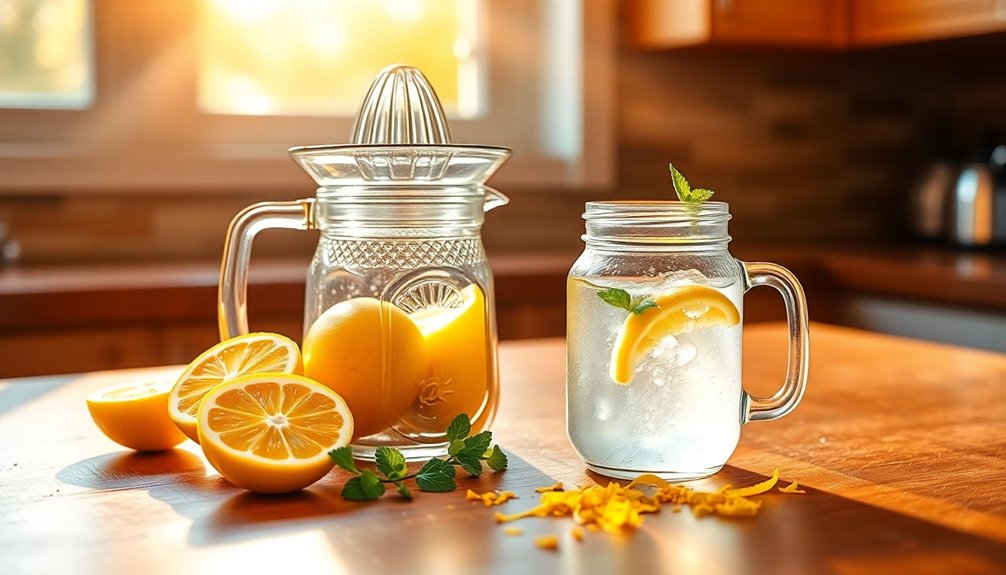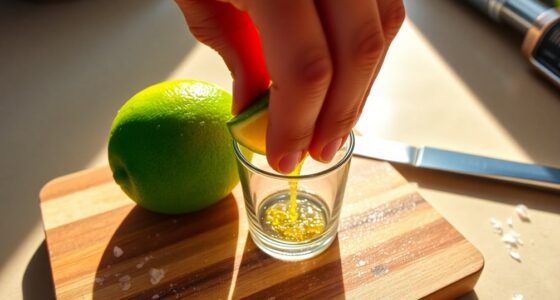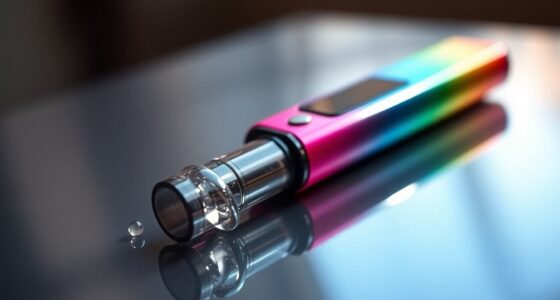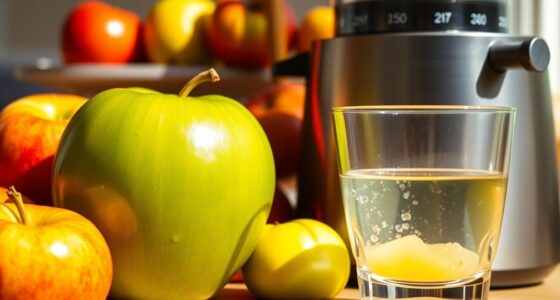To make lemon juice concentrate, start by juicing 6 to 10 fresh lemons and straining the juice to remove seeds and pulp. Combine the juice with granulated sugar at a ratio of 2 cups of juice to 1 cup of sugar in a saucepan. Heat over medium-low, stirring until the sugar dissolves, then let it cool. Transfer it to airtight containers and store it in the fridge or freeze for later. You’ll discover more helpful tips ahead. For those looking to extend the shelf life of their lemon juice concentrate, consider how to prepare frozen juice concentrate. Simply pour the cooled mixture into ice cube trays or small portions in airtight bags, allowing for easy use later on. When you’re ready to enjoy the concentrated flavor, just thaw the desired amount and mix it with water for a refreshing beverage.
Key Takeaways
- Juice 6 to 10 fresh lemons, strain the juice to remove seeds and pulp, and measure the volume for sugar ratio.
- Combine 2 cups of strained lemon juice with 1 cup of granulated sugar in a medium saucepan.
- Heat the mixture over medium-low heat, stirring continuously until the sugar fully dissolves without boiling.
- Allow the lemon juice concentrate to cool, then transfer it into airtight containers for storage.
- Label containers and freeze for long-term use, or refrigerate for short-term access to fresh lemon flavor.
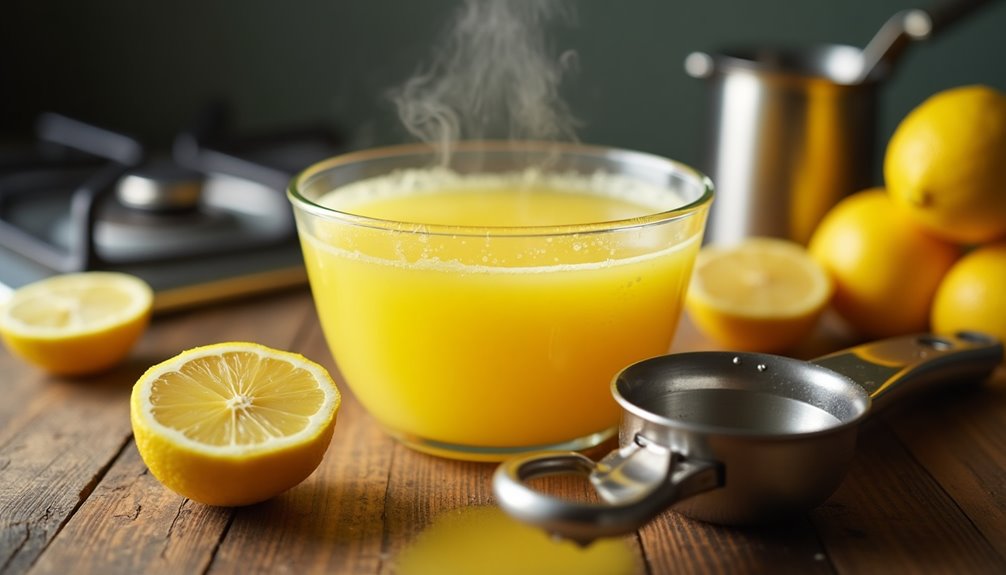
If you love the bright, tangy flavor of lemon juice but want a concentrated version to use in drinks, desserts, or marinades, making lemon juice concentrate at home is simple and rewarding. You can enjoy a burst of lemony goodness anytime you need it, and it's a great way to preserve the freshness of lemons.
Start by gathering fresh lemons; you'll need quite a few to yield a good amount of concentrate. Depending on how much you want to make, you might need anywhere from six to ten lemons, so plan accordingly.
Once you have your fresh lemons, it's time to juice them. Cut each lemon in half and use a juicer or your hands to extract as much juice as possible. You want to ensure you have a sufficient quantity based on your desired yield.
After juicing, strain the liquid through a fine mesh sieve to remove any seeds and pulp. This step is crucial if you want a smooth concentrate. After straining, measure the volume of juice you've collected. This measurement will help you determine how much sugar to add in the next step.
For your homemade lemonade concentrate recipe, you'll typically want to use a ratio of about 1 cup of granulated sugar for every 2 cups of lemon juice. This balance enhances the flavor and sweetness of the concentrate.
In a medium saucepan, combine the strained lemon juice with the sugar. Heat the mixture over medium-low heat, stirring continuously. You want the sugar to dissolve completely without boiling the mixture, as boiling could alter the delightful flavor of your lemon juice.
Once the sugar has fully dissolved, remove the saucepan from the heat and let the mixture cool. Cooling is an essential step, as it ensures that your concentrate will store well without affecting taste.
After it's cooled down, you can transfer your lemon juice concentrate into airtight containers. If you plan to use it soon, you can simply store it in the refrigerator. However, if you want to save it for later, consider freezing it. Pour the concentrate into freezer-safe containers or ice cube trays for easy portioning.
Before you freeze, be sure to label and date your containers. This way, you'll always know exactly what you have on hand.
When you need a splash of lemon flavor in your cocktails, desserts, or marinades, simply pull out the amount you need. Homemade lemon juice concentrate is a delightful addition to your kitchen pantry, allowing you to enjoy the zesty flavor of fresh lemons in a more convenient form.
In no time, you'll be impressing friends and family with your ability to whip up delicious drinks and dishes, all thanks to your homemade concentrate!
Frequently Asked Questions
How Is Lemon Juice Concentrate Made?
Lemon juice concentrate's made by squeezing fresh lemons to extract the juice, then removing excess water.
You can do this through freeze-distillation or gentle heating methods. When freezing, you let ice crystals form and collect the liquid as it melts.
Alternatively, heating the juice between 60°C and 85°C concentrates the flavor without adding bitterness.
Adding sugar can improve the taste, making it a versatile ingredient for many recipes.
How to Make Lemon Concentrate at Home?
Making lemon concentrate at home is like capturing summer in a jar.
Start by squeezing fresh lemons to extract the juice, then mix it with lemon zest, water, and sugar in a saucepan. Heat gently until the sugar dissolves.
Once cooled, transfer your mixture to an airtight container. Store it in the fridge or freeze it for later.
You'll have a refreshing concentrate ready whenever you want to enjoy a glass of lemonade!
Can I Make My Own Juice Concentrate?
Yes, you can definitely make your own juice concentrate! Start by squeezing fresh citrus fruits to extract the juice.
Then, you can either gently heat it to reduce the water content or use freeze-distillation to concentrate the flavor.
Just be careful not to overheat the juice, as that might make it bitter.
Once you've created your concentrate, store it in the freezer for easy access whenever you want to enjoy that fresh taste!
Is Lemon Juice and Lemon Juice Concentrate the Same?
You might be wondering if lemon juice and lemon juice concentrate are the same.
Well, hold on! They're not quite identical.
Lemon juice is fresh and zesty, while lemon juice concentrate has had most of its water removed, resulting in a thicker, more intense flavor.
This concentration process enhances certain qualities, making it last longer but also changing its profile a bit.
Conclusion
Now that you've mastered the art of making lemon juice concentrate, you can transform your kitchen into a citrus paradise. Picture yourself, like a modern-day alchemist, turning simple lemons into liquid gold for refreshing drinks and zesty recipes. With just a few steps, you've bottled up summer's sunshine, ready to brighten up your dishes all year round. So go ahead, savor the tangy delight and let your culinary creativity shine, just like the sun on a warm afternoon!
Cindy thoroughly researches juicing trends, techniques, and recipes to provide readers with practical advice and inspiration. Her writing style is accessible, engaging, and designed to make complex concepts easy to understand. Cindy’s dedication to promoting the advantages of juicing shines through her work, empowering readers to make positive changes in their lives through the simple act of juicing.

